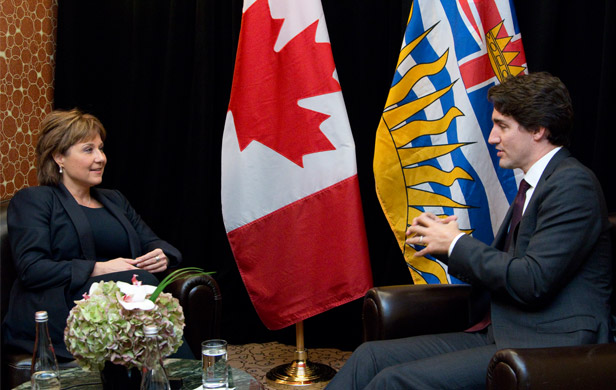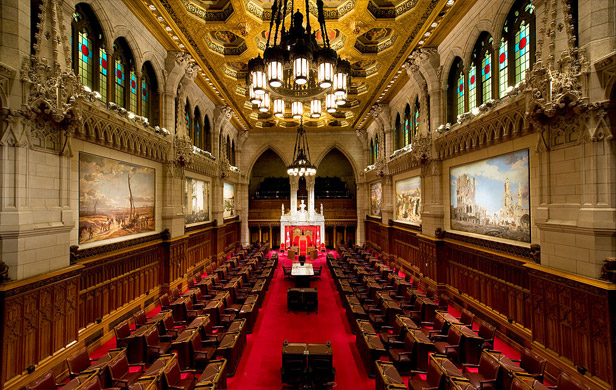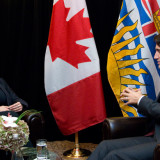
Premier Christy Clark is quite right to reject prime minister Trudeau’s silly games with the Senate. It’s just a pity that she must always add irrelevant political mumbo-jumbo to water down and detract from the impact of BC’s decision.
Our position has nothing to do with improving the economy or creating jobs but somehow it’s her political nature to throw in this sort of stuff. It’s harmful because it distracts attention from what is a very serious issue and forecloses the possibility of a rational discussion.
That the present Senate is a bad joke, especially to British Columbia – which has but two more seats than Prince Edward Island and four fewer than New Brunswick – goes without saying. The temptation to simply say to Hell with it is very strong indeed.
Senate has a use – just not in its current form
The easy way to deal with the Senate, obviously, is to simply abolish it. The NDP have taken that position for as long as I can remember but they never seem to reason out what the consequences would be – a country legally dominated politically by Ontario and Quebec. In my view, it’s critical to go back to basics and discuss whether or not we need a Senate, and if so, what form it should take, its powers, the representation issue, and how should it be filled.
I would argue that we will not keep this country together if we only have a House of Commons run by the two central Canadian provinces as far ahead as we dare look. There is no doubt that having provincial powers under section 92 of the Constitution does alleviate the Ottawa dictatorship but what we’re talking about surely is trying to create a national parliament, not a conglomeration of shopping centres.
Land of distinct regions
Canada is too large a country to be a unitary state. Not only is Canada a large, it has different histories from region to region. I invite people to read Jean Barman’s wonderful book, The West Beyond the West to see the separate development of this province from other Canadian regions. Clearly, Atlantic Canada has at least two histories and cultures; Ontario and Quebec we know about; and the Prairie Provinces developed differently and have different demographics and cultures. It is not, therefore, just geography we must unite, but people.
This challenge was seen by the Fathers of Confederation who botched the solution. A Senate must have several characteristics. It’s purpose is to provide representation to regions so as to overcome the dictatorship of strict representation by population. If we don’t want to do that then we must accept the complete domination of the central provinces over the rest of the country in all matters large and small that have national overtones.
I, for one, reject that notion. That being said, if we create a new upper house, how do we parcel out the representation?
What should a reformed Senate look like?

If we base it on population, we’ve accomplished nothing except duplicate the Commons. The US solution is two representatives from each state. This means that states with small populations have the same representation as the large ones but, fortunately, because the states are scattered the way they are, it works out fairly evenly from region to region. That, however, is more good luck than good management.
Germany, has an upper house for the Lander, or regions, where Lander with larger populations have more members than smaller ones, but not the number that their population would entitle them to.
If we decide we do need an Upper House because of the nature of our country, which I believe we do, it means we have to sit down and deal. If the motive is to make a big country stronger and guarantee its permanency, surely there are men and women capable of putting this together.
There is the question as to how the Senators are selected. To have, as we now have, senators appointed by the federal government to represent the regions is akin to having the fox in charge of the hen house – an obvious conflict of interest which only means that the House of Commons has a stranglehold on the Upper House, tempered only by the individuality that from time to time shows itself.
If the senators are to be appointed, then that must be done by the provinces. If they are to be elected, it creates the aura and the fact of democracy that I think is critical.
Abolishing the Senate isn’t the answer
I happen to have had a pretty long history involved in constitutional affairs, including some pretty heavy debates on the Senate. During the run-up to the patriation of the constitution in the 70s, in which I was officially involved, it was instructive to note that Senate reform was a very good idea to all provinces except Ontario and Quebec, which had a hell of a good deal the way it was.
Yes, we can save ourselves a lot of trouble by just abolishing the Senate, although the constitutional ability to do that is compromised by the need for unanimity amongst the provinces, which might not be forthcoming. Assuming that it is, then we must clearly understand what the consequences would be.
If, on the other hand, we feel that there is good reason for an upper house in Canada, we will have to make up our minds to work our butts off to overcome the difficulties involved in creating such an institution that actually works and accomplishes our ambitions. If we are too lazy or indifferent to the nation’s long-term well-being, then we won’t go down this road.
A better way for Clark to go about it
This is the problem that arises out of Premier Clark’s rejection of Mr. Trudeau’s idiotic and – for British Columbia – insulting solution. Premier Clark recognized the insult and had she simply rejected the “solution” and gone on to say that BC will cooperate in the future as it always has in the past in creating an upper house that is fair to all, that would be statesmanship.
I hope and trust that the premier thinks about this, studies the history of British Columbia’s long and constructive contribution to this subject, and undertakes to continue that process starting immediately.


I’m sorry Rafe but I disagree.
If we abolish the Senate we still have the Supreme Court to toss out bad laws.
If parliament rams through unpopular legislation the voters will speak at the next election.
We dont need more elections, more lobbyists, more lies amd more pigs at the govt trough.
I vote for a triple “A” Senate.
Abolish Abolish Abolish.
Premier Clark’s response on the senate was that of a petulant child. She stopped just short of saying “I’m taking my ball and going home”.
Rafe, I appreciate your passion for British Columbia but if Canada is to survive, the relentless focus on the politics of geography has to stop. Our MP’s are based on geography. That, coupled with a voting system that artificially rewards regional party strength, tends to accentuate regionalism. The provinces themselves have enormous political power (look at the COP21 negotiations in Paris, the federal government is largely helpless unless the provinces buy in). Then on top of that, we need to make the senate a voice for the regions? That’s nuts!!
I don’t understand why we are hung up on this 17th century notion that someone who lives in our neighborhood can better represent our interests than someone on the other side of the country. We already have more than enough regionalization in this country – we need to re-imagine constituencies.
If Canada is a large entity with diverse interests, so too is BC. Can someone from Vancouver Island better represent the interests of Prince George than a person from say, Saskatoon?
The senate should be based on constituencies that are possible with 21st century communication technologies. Let’s re-imagine democracy and get past the pettiness of geography as the be-all and end-all of democracy.
Since Confederation Quebec and Ontario have been the nucleus of Canada. The nucleus around which the rest of the country revolved. It is impossible to shift that balance without disrupting, and quite possibly destroying the country. The last ten years are a perfect illustration of what happens when that is attempted. Harper tried to shift the power balance in Alberta’s favour by setting the stage for an unfettered Alberta economic expansion. He did away with environmental regulations standing in Alberta’s way. Canadian currency shifted to one based on petro dollars rather than one based on Central Canadian manufacturing. Political decisions became based on some weird conservative prairie populism rather than what Canadians other than the Conservative base took to be self-evident common sense. Nobody is going to open a Constitutional debate about making the Senate more fair. The country has bigger fish to fry than a handful of political toadies with their hands in taxpayer pockets. What Trudeau is trying to do here is about the best that can be done under the circumstances. Kudos to him for at least trying, and shame on those who reject an opportunity for BC to at least have a say in who our few senate appointees are. To not make any advancement on solving a problem because it does not solve the problem in its entirety is foolish in the extreme.
Initiation of a process intended to address Senate structural and functional deficiencies is a first step. Blanket rejection of that initiative by Clark is exactly the wrong response and immensely negative. It debases and politicizes the entire bundle of Senate issues in that sabotaging word ‘no’! There might be redemption for Trudeau’s initiative even if the process ends, after consideration and consultation, in ‘abolish’. But Clark’s position is vile and stupid from the get-go and has the perverse effect of sustaining the Senate status quo!